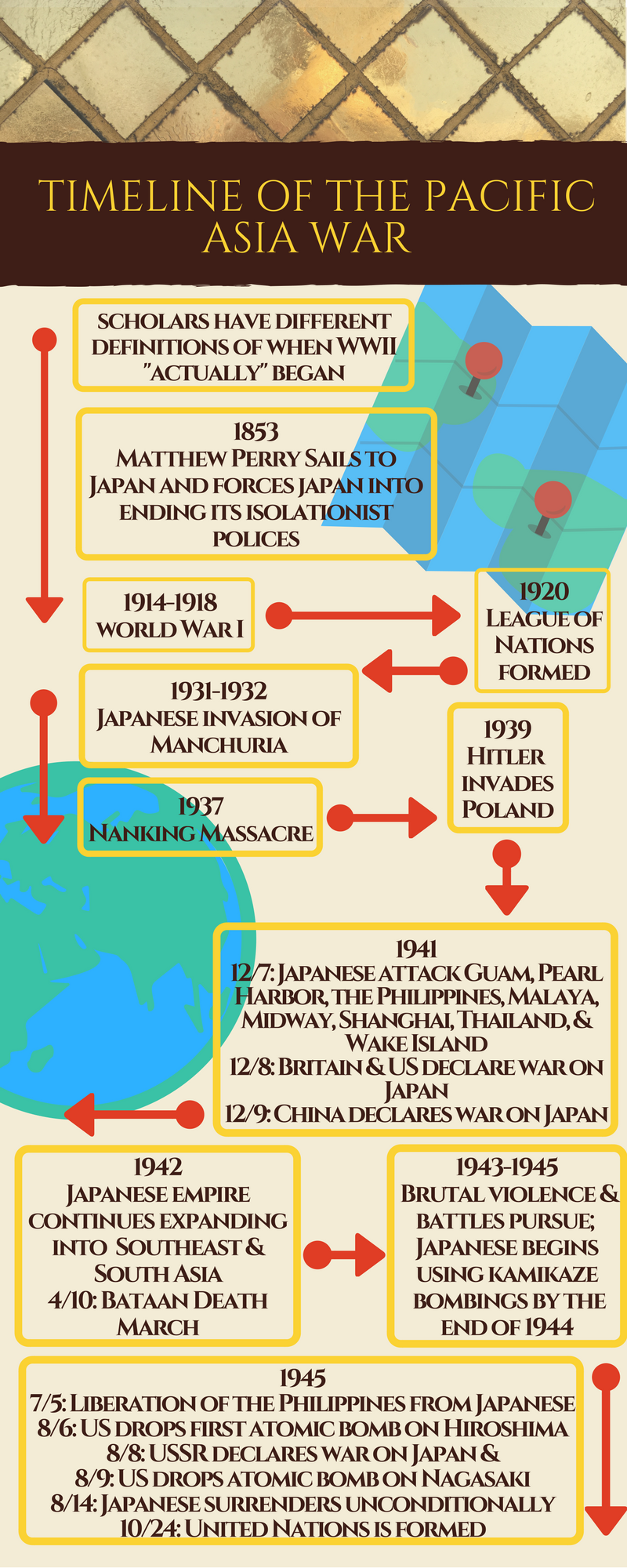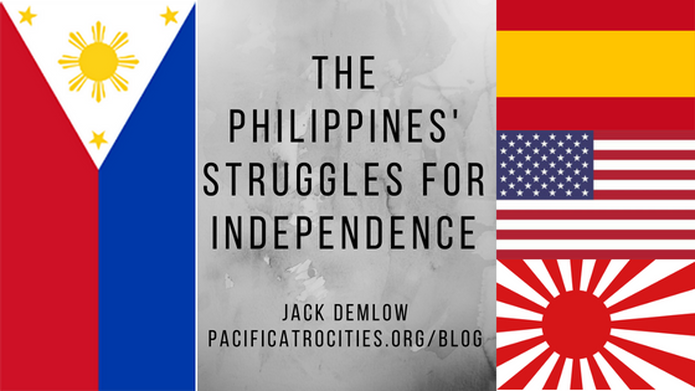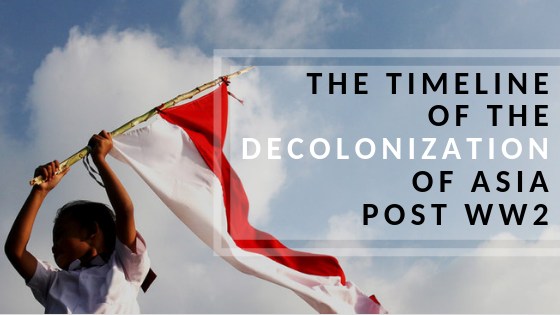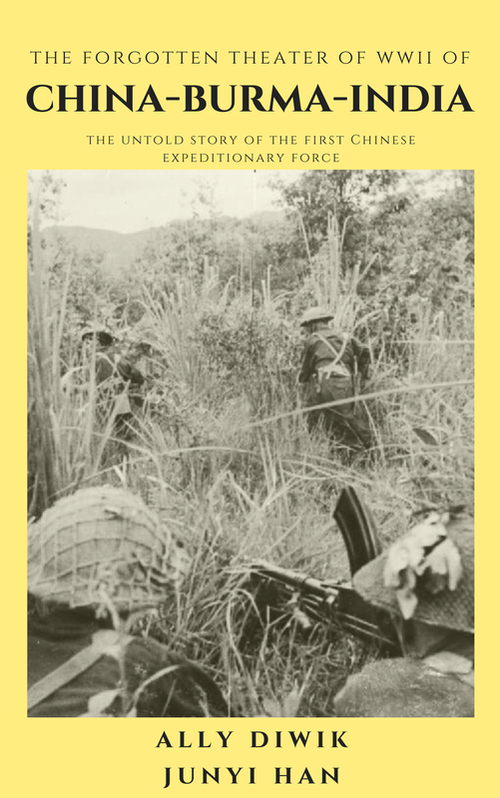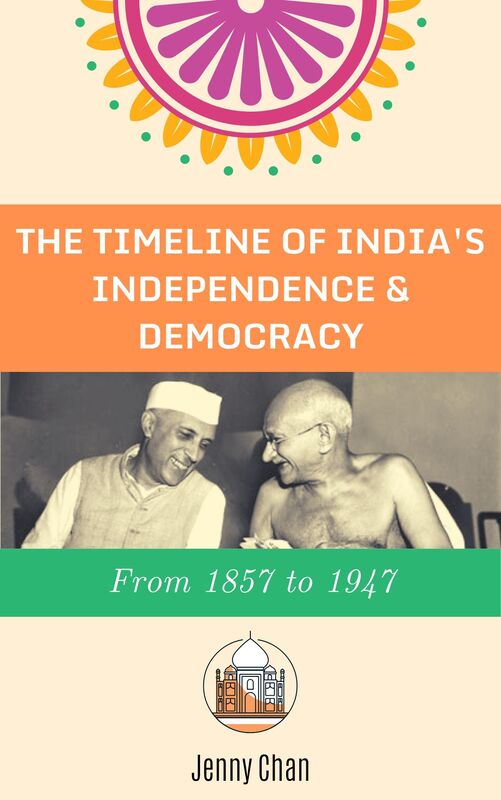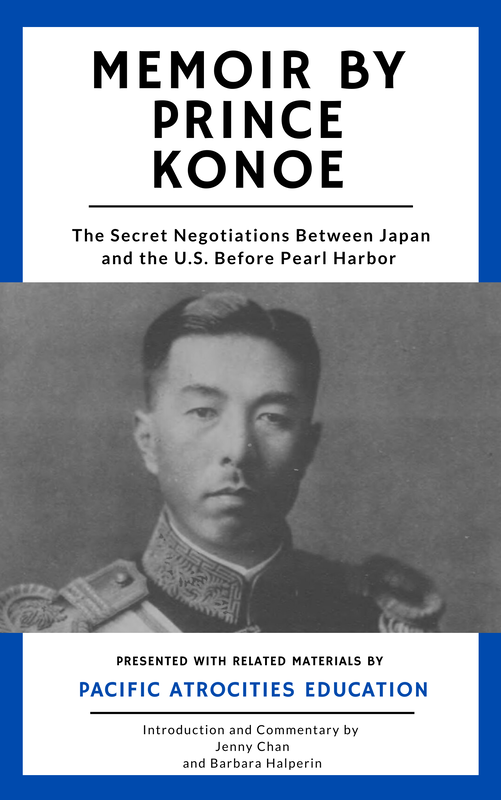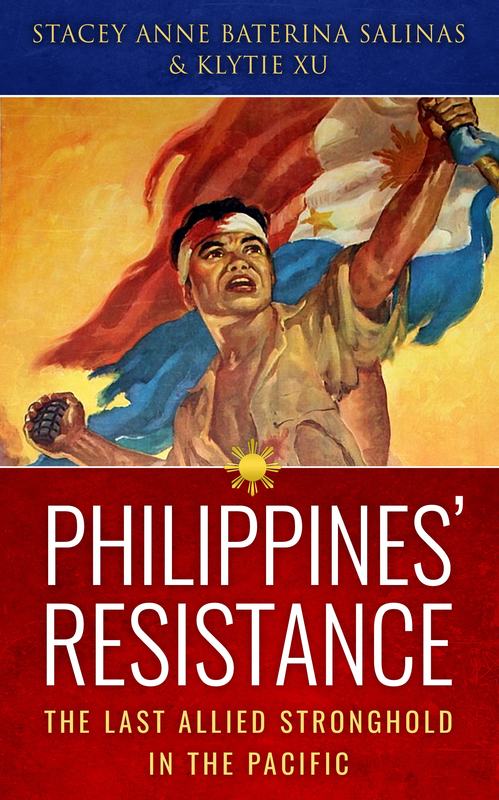|
by Syona Puliady In public schools throughout the United States, students often learn that Asian involvement in World War II began with the Japanese bombing of Pearl Harbor. From this perspective the war began in 1941. However, this incident did not occur in isolation—in fact, there were a series of events that preceded this attack that are often left forgotten in American education. From the Eurocentric lens, WWII began in 1939 when Germany invaded Poland causing Britain and France to declare war on Germany. However, if we approach WWII from the Asian Pacific perspective, fragments of this war takes root beyond that. An argument can be made that the beginnings of this war started in 19th century Japan, when American policies forced an isolated Japan into opening up trade with the United States. This led to the modernization and Westernization of Japan that transformed the country politically and economically. While the development of Japan was inevitably informed, defined, and inspired by Western concepts of progress, Japan also adopted ideas of militarized imperialism and colonialism from these Westerners as well. At this time, Japan also fought on behalf of the West during WWI. While Japan was recognized for its efforts, it was not given an equal status to Western nations during the making of the League of Nations. This resonated badly with the Japanese, as they had not only proven their great military abilities, but it seemed as if they were being punished for it. This was because in many of the agreements made by the League of Nations, Japan was not allowed to engage in the same type of imperialism and/or colonialism as Western countries had been pursuing in the Far East. Restricting Japan’s access from engaging in similar imperial or colonial conquests prevented Japan from being a strong global power that could compete with the West. Regardless of what was agreed upon by the League of Nations, Imperial Japanese Army invaded the northeastern Chinese province, Manchuria, in 1931. Even though Western countries had their own dark, violent histories of imperialism and colonialism all over the world, they still frowned upon Japan’s decision to control Manchuria. The Imperial Japanese invasion of Manchuria led to rising tensions between Imperial Japanese and Chinese relations that were already strained. This ultimately led to the second war between Japan and China in 1937, which lasted for eight years. Many scholars mark this event as the beginning of WWII in the Asian Pacific, as this war caused grave casualties, traumas, and atrocities to various communities within this region. Feeling betrayed by Western allies, Japan sought a different approach of governance that would better suit its own needs. By appropriating Japanese feudal history and the importance of samurais, militarized extremists were able to rise to power and manipulate the people into believing narratives of Japanese superiority that justified Japan’s desire to control the Far East. While Japan claimed it was following its own pre-modern history of governance and rule, they were still upholding Western notions of control and conquest that had pillaged and plundered the rest of the world. During the war with China at this time, the Imperial Japanese Army carried out a number of violences that resulted in the United States issuing a number of economic sanctions against Japan. These economic sanctions only brought about more aggression from Japan; this was another instance in which Japan perceived that the West was preventing their nation from gaining power like Western countries were able to in their colonies. Disregarding what these nations had to say about Japanese colonialism, Imperial Japanese Army continued taking over parts of China and quickly joined forces with those fighting against the nations that had been prohibiting Japan’s rise to power. Soon after this alliance was formed, some Western nations, including the United States, issued trade embargo with Japan. One of the most notable allies Imperial Japan made at this time was with Nazi Germany. Using Hitler’s model of conquest as a guide, Imperial Japan planned to conquer other parts of Asia in order to make up for the economic losses they were suffering from due to being cut off from crucial trade routes. Thus, in 1941, the Imperial Japanese Army bombed a number of places in the Asian Pacific (including Pearl Harbor), with surprise attacks. For many Japanese Nationalists, this was a victory against Western powers that had attempted to prohibit Asian nations from becoming global powers. As many American students are taught, this marks the United States’ entrance into WWII. After these bombings, the Imperial Japanese Army continued to exploit and attack people of other nations. It continued to conquer other parts of Asia while implementing cruel policies in order to strengthen their regime. From 1941-1945 a number of violent exchanges between Japan and the other nations involved pursue, causing catastrophic situations all over the Asian Pacific region. Ultimately, the strength of military technology possessed by the West forces the Imperial Japanese Army to surrender towards the end of 1945. References Boulding, E. Cultures of Peace: The Hidden Side of History. New York: Syracuse University Press, 2000. Fujitani, T. White, Geoffrey M., Yoneyama, Lisa, eds. Perilous Memories: The Asia-Pacific War(s). Durnham and London: Duke University Press, 2001. "World War Two in the Pacific." The History Place. http://www.historyplace.com/unitedstates/pacificwar/timeline.htm. 1999. In public schools throughout the United States, students often learn that Asian involvement in World War II began with the Japanese bombing of Pearl Harbor. From this perspective the war began in 1941. However, this incident did not occur in isolation—in fact, there were a series of events that preceded this attack that are often left forgotten in American education. Related ArticlesRelated Books
4 Comments
Ken Joyce
5/2/2018 07:24:03 am
It is also never reported that Communism and the spread of Communism in Asia was also a catalyst for war. One also needs to ask why Roosevelt, a Socialist Democrat, handed all of Asia over to the Communists?
Reply
O
1/24/2022 11:26:46 am
O
Reply
Stephen Payton
7/9/2023 08:54:17 am
Useful overview but it is vitally lacking any reference to Japan's wars with Korea and Korea being annexed by Japan in 1910.
Reply
Leave a Reply. |
- Home
- Stories
-
Internship
- Summer 2024 Internship
- Summer 2023 Internship
- Fall 2022 Internship
- Summer 2022 Internship
- Summer 2021 Internship
- Fall 2020- Spring 2021 Internship
- Summer 2020 Internship
- Fall 2019 Internship
- Summer 2019 Internship >
- School Year 2018-2019 Internship
- Summer 2018 Internship >
- Fall 2017 Internship
- Summer 2017 Internship >
- Books
- Archives
-
Resource Page
-
Supplementary Research Guides
>
- Unit 731 - Guide >
-
Philippines' Resistance - Guide
>
- Philippines World War II Timeline
- The Japanese Invasion & Conquest of the Philippines
- Bataan Death March
- Formation of Underground Philippines Resistance
- Supplies of the Guerrilla Fighters
- The Hukbalahap
- Hunter's ROTC
- Marking's Guerrillas
- United States Army Forces in the Philippines of Northern Luzon (USAFIP-NL)
- The Aetas
- Chinese and Filipino-Chinese Nationalist Guerrilla Units
- The Female Faces of the Philippine Guerrillas
- Rising Sun Flag - Guide >
- Pinay Guerrilleras - Guide >
- Fall of Singapore - Guide >
- Three Years and Eight Months - Guide >
- Siamese Sovereignty - Guide >
- The Khabarovsk War Crimes Trial - Guide >
- Unit 731 Cover-up : The Operation Paperclip of the East - Guide >
- Marutas of Unit 731 - Guide >
- Prince Konoe Memoir - Guide >
- Competing Empires in Burma - Guide >
- Battle of Shanghai - Guide >
- Ishi Shiro - Guide >
- Taiwan The Israel of the East - Guide >
- Seeking Justice for Biological Warfare Victims of Unit 731 - Guide >
- Rice and Revolution - Guide >
- Clash of Empires - Guide >
-
Hunger for Power and Self-SufficiencyI - Guide
>
- The Influence of War Rations on Post-War Culinary Transformations
- How World War II Complicated Food Scarcity and Invention
- American Military Innovations
- Government-Sponsored Food Inventions in Europe during World War II
- Feeding the Army: The Adaptation of Japanese Military Cuisine and Its Impact on the Philippines
- Mixed Dishes: Culinary Innovations Driven by Necessity and Food Scarcity
-
Denial A Quick Look of History of Comfort Women and Present Days’ Complication - Guide
>
- The Comfort Women System and the Fight for Recognition
- The Role of Activism and International Pressure
- The Controversy over Japanese History Textbooks
- The Sonyŏsang Statue and the Symbolism of Public Memorials
- Activism and Support from Japanese Citizens
- The Future of Comfort Women Memorials and Education
- Echoes of Empire: The Power of Japanese Propaganda - Guide >
- Lesson Plans >
-
Supplementary Research Guides
>
|
Pacific Atrocities Education
730 Commercial Street San Francisco, CA 94108 415-988-9889 |
Copyright © 2021 Pacific Atrocities Education.
We are a registered 501 (c)(3) charity. |
- Home
- Stories
-
Internship
- Summer 2024 Internship
- Summer 2023 Internship
- Fall 2022 Internship
- Summer 2022 Internship
- Summer 2021 Internship
- Fall 2020- Spring 2021 Internship
- Summer 2020 Internship
- Fall 2019 Internship
- Summer 2019 Internship >
- School Year 2018-2019 Internship
- Summer 2018 Internship >
- Fall 2017 Internship
- Summer 2017 Internship >
- Books
- Archives
-
Resource Page
-
Supplementary Research Guides
>
- Unit 731 - Guide >
-
Philippines' Resistance - Guide
>
- Philippines World War II Timeline
- The Japanese Invasion & Conquest of the Philippines
- Bataan Death March
- Formation of Underground Philippines Resistance
- Supplies of the Guerrilla Fighters
- The Hukbalahap
- Hunter's ROTC
- Marking's Guerrillas
- United States Army Forces in the Philippines of Northern Luzon (USAFIP-NL)
- The Aetas
- Chinese and Filipino-Chinese Nationalist Guerrilla Units
- The Female Faces of the Philippine Guerrillas
- Rising Sun Flag - Guide >
- Pinay Guerrilleras - Guide >
- Fall of Singapore - Guide >
- Three Years and Eight Months - Guide >
- Siamese Sovereignty - Guide >
- The Khabarovsk War Crimes Trial - Guide >
- Unit 731 Cover-up : The Operation Paperclip of the East - Guide >
- Marutas of Unit 731 - Guide >
- Prince Konoe Memoir - Guide >
- Competing Empires in Burma - Guide >
- Battle of Shanghai - Guide >
- Ishi Shiro - Guide >
- Taiwan The Israel of the East - Guide >
- Seeking Justice for Biological Warfare Victims of Unit 731 - Guide >
- Rice and Revolution - Guide >
- Clash of Empires - Guide >
-
Hunger for Power and Self-SufficiencyI - Guide
>
- The Influence of War Rations on Post-War Culinary Transformations
- How World War II Complicated Food Scarcity and Invention
- American Military Innovations
- Government-Sponsored Food Inventions in Europe during World War II
- Feeding the Army: The Adaptation of Japanese Military Cuisine and Its Impact on the Philippines
- Mixed Dishes: Culinary Innovations Driven by Necessity and Food Scarcity
-
Denial A Quick Look of History of Comfort Women and Present Days’ Complication - Guide
>
- The Comfort Women System and the Fight for Recognition
- The Role of Activism and International Pressure
- The Controversy over Japanese History Textbooks
- The Sonyŏsang Statue and the Symbolism of Public Memorials
- Activism and Support from Japanese Citizens
- The Future of Comfort Women Memorials and Education
- Echoes of Empire: The Power of Japanese Propaganda - Guide >
- Lesson Plans >
-
Supplementary Research Guides
>
